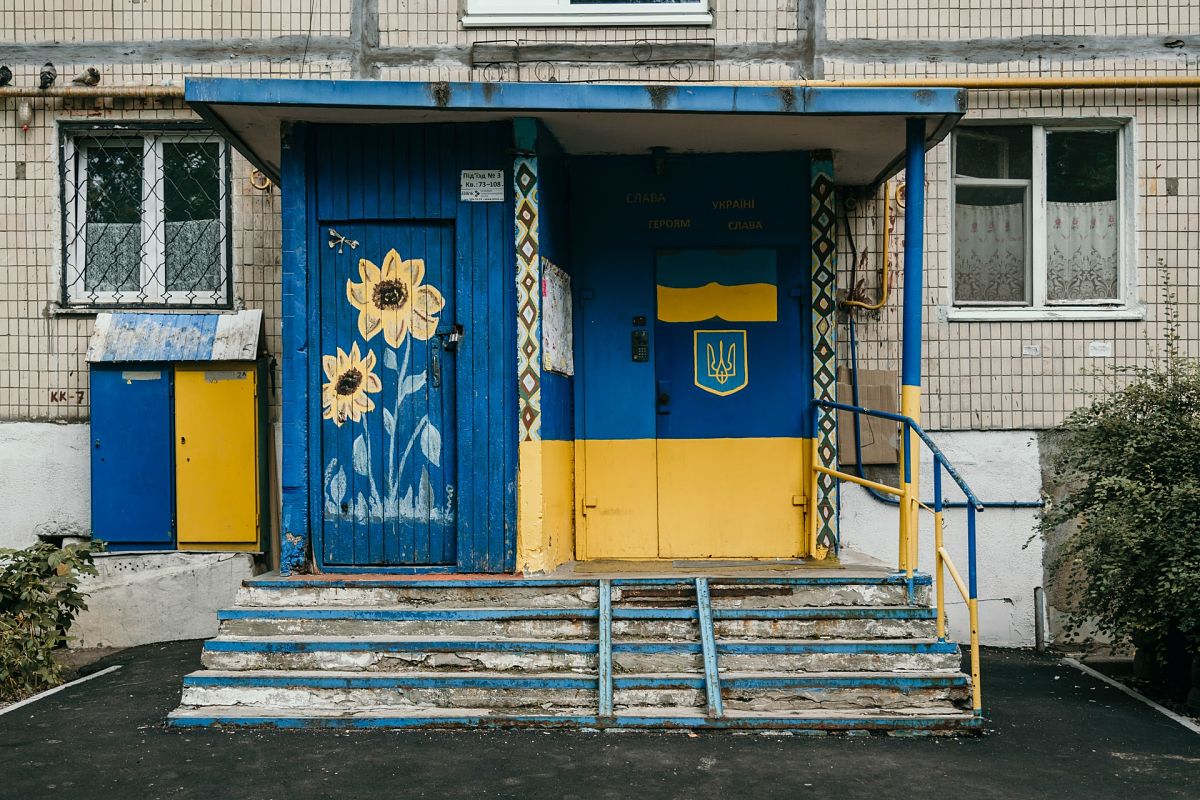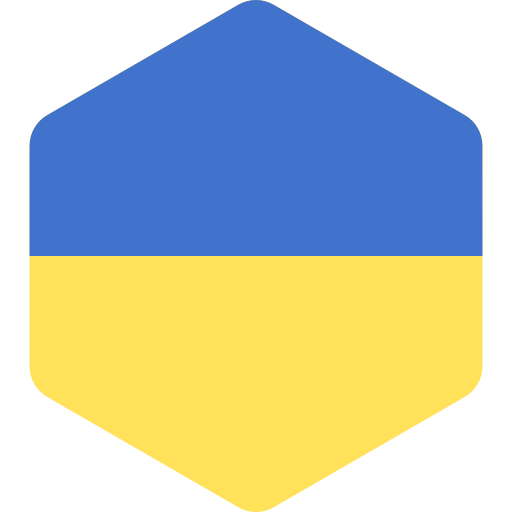Ukraine - Culture, Etiquette and Business Practices
Welcome to our guide to Ukraine.
Perfect for anyone researching the people, society, manners and business culture!
What will you Learn?
You will gain an understanding of a number of key areas including:
- Language
- Religion and beliefs
- Culture and society
- Social etiquette and customs
- Business culture and etiquette

National symbols and colours on display on an apartment block in Kiev. Photo by Marjan Blan | @marjanblan on Unsplash
Facts and Statistics
Location: Eastern Europe, bordering the Black Sea, between Poland, Romania, and Moldova in the west and Russia in the east
Capital: Kyiv (Kiev)
Climate: temperate continental; Mediterranean only on the southern Crimean coast; precipitation disproportionately distributed, highest in west and north, lesser in east and southeast; winters vary from cool along the Black Sea to cold farther inland; summers are warm across the greater part of the country, hot in the south
Population: 44 million (2019 est.)
Ethnic Make-up: Ukrainian 77.8%, Russian 17.3%, Belarusian 0.6%, Moldovan 0.5%, Crimean Tatar 0.5%, Bulgarian 0.4%, Hungarian 0.3%, Romanian 0.3%, Polish 0.3%, Jewish 0.2%, other 1.8%
Religions: Ukrainian Orthodox - Kyiv Patriarchate 19%, Orthodox (no particular jurisdiction) 16%, Ukrainian Orthodox - Moscow Patriarchate 9%, Ukrainian Greek Catholic 6%, Ukrainian Autocephalous Orthodox 1.7%, Protestant, Jewish, none 38%
Language in Ukraine
Ukrainian is the official state language; it is a language of the East Slavic subgroup of the Slavic languages. The language shares some vocabulary with the languages of the neighbouring Slavic nations, most notably with Belarusian, Polish, Russian and Slovak.
The Ukrainian language traces its origins to the Old East Slavic language of early medieval state of Kievan Rus'. In its earlier stages it was called Ruthenian. The language has persisted despite several periods of bans and/or discouragement throughout centuries as it has always nevertheless maintained a sufficient base among the people of Ukraine, its folklore songs, itinerant musicians, and prominent authors.

The infamous Pripyat sign at the entrance to the Chernobyl site near the town of Pripyat. Photo by Gabriella Clare Marino on Unsplash
Ukrainian Society and Culture
The People
Ukrainians are of Slavic origin. About 75% of the population is ethnic Ukrainian. The largest minority group is the Russians at about 20%. Belarussians, Bulgarians, Poles, Hungarians and Romanians make up the other major minority groups.
Religion
Approximately 40% of the population in Ukraine describe themselves as atheist. Of those that do adhere to some form of religion, 37% belong to one of the three major orthodox denominations present in the country. There are also a significant and growing number of Jews, Protestants and Muslims.
Despite the large numbers describing themselves are atheist, Ukrainians are extremely superstitious. If you do something that they believe can cause harm such as sitting on stone steps, someone will undoubtedly tell you that you risk doing great harm to yourself as a result of your actions. Superstitions are derived from folk wisdom in rural communities.
Fatalistic
Ukrainians live in a country where everyday life is often unpredictable and unstable and they have learned to adapt to constantly changing rules and laws. The influences of the Russian Orthodox Church plus a long history of turbulent economic times, unstable governments, and adverse climatic conditions produce a rather fatalistic approach towards life.
Generosity
Ukrainians are extremely generous and hospitable. All social occasions include food. Visitors are always offered something to eat as well as a beverage. It is considered the height of rudeness to eat in front of another person and not offer them something.
A group of friends enjoying some downtime in the park. Photo taken in Lviv by Roman Holoschchuk on Unsplash
Etiquette and Manners in Ukraine
Meeting and Greeting
- The typical greeting is a warm, firm handshake, maintaining direct eye contact, and repeating your name.
- When female friends meet, they kiss on the cheek three times, starting with the left and then alternating, while close male friends may pat each other on the back and hug.
- Ukrainian names are comprised of:
- First name, which is the person’s given name.
- Middle name, which is a patronymic or a version of the father’s first name formed by adding "-ovych" for a male and "ivna" for a female. The son of Oleksii would have a patronymic of Oleksiiovych while the daughter’s patronymic would be Oleksiivna.
- Last name, which is the family or surname. The ending of a person's last name depends on their sex - males keep the traditional ending " Myroslav Kovalenko" and females have an "a" ending, "Laryssa Kovalenka", just like first name endings.
- In formal situations, people use all three names.
- Friends and family members use first names without patronymics and last names.
- Patronymics are saved for workplaces, especially in more conservative sectors such as government, banking, healthcare, etc
Gift Giving Etiquette
- Ukrainians exchange gifts with family and close friends on birthdays and the Orthodox Christmas.
- Name days’ (birth date of the saint after whom a person was named) are also celebrated rather than birthdays by some.
- Gifts need not be expensive. It is the act of giving the gift that is important, since it symbolises friendship.
- If you are invited to a Ukrainian’s home for a meal it is polite to bring something; cake, flowers, or a bottle of imported liquor.
- Flowers should only be given in odd numbers and avoid yellow flowers.
- Gifts are generally not opened when received.
Dining Etiquette
- Table manners are generally casual.
- The more formal the occasion, the stricter the protocol.
- When in doubt, watch what others are doing and emulate their behaviour.
- Table manners are Continental, i.e. hold the fork in the left hand and the knife in the right while eating.
- Do not begin eating until the host invites you to start.
- Always keep your hands visible when eating. Keep your wrists resting on the edge of the table.
- The oldest or most honoured guest is served first.
- Try everything. Refusing a dish is considered very rude.
- You will often be urged to take second helpings.
- Toasting is part of the culture and generally occurs whenever three or more people share a meal.
- Ukrainians are suspicious of people who do not drink. Having said that, it is better to offer a medical condition as an excuse rather than starting to drink and failing to keep pace with your Ukrainian counterparts.
- A common toast is "Na zdrovya", which means "to your health".
- The host gives the first toast, usually to the guest of honor, who may return the toast later in the meal.
- Most toasts are given with vodka. You need not finish the glass, but you must take a sip.
- Do not clink your glass with others during a toast if you are not drinking an alcoholic beverage.
- Glasses are filled no more than two-thirds full.
- Never refill your own glass.
- Do not pour wine backhanded.
- An open bottle must be finished.
- Empty bottles are not left on the table. They are immediately removed.
A young lady enjoying a warm evening outside in Odessa. Photo by Julia Smorochinskaya on Unsplash
Business Culture and Etiquette
If you're looking for expert help and advice on how to do business with Ukraine, then this is what we do!
Click here to learn more about our customized cultural training.
Meeting and Greeting
- Ukrainian businesspeople are generally less formal than in many other countries.
- Shake hands with everyone upon arriving and leaving.
- Handshakes are quite firm.
- Maintain eye contact during the greeting.
- It is common to repeat your name while shaking hands.
- Academic and professional titles are commonly used with the surname.
- If someone does not have an academic or professional title, use the honorific "Pan" for a man (Mr) and "Pani" for a woman (Mrs) with the surname, or "Panna" (Miss).
- Most business colleagues refer to each other by first name and patronymic. (Middle name which is a version of the father’s first name formed by adding "-vich" or "-ovich" for a
- male and "-avna", "-ovna", or "ivna" for a female.)
- When using someone's complete name, including the patronymic, the honorific title is not used.
- The way someone is addressed often depends upon the situation. Titles and surnames are used in meetings and may give way to first names or diminutives in social situations.
- Business cards are exchanged without ritual.
- Have one side of your business card translated into Ukrainian.
- Include advanced university degrees on your business card.
- Present your card so the Ukrainian side faces the recipient.
- If someone does not have a business card, note the information in your appointment book or portfolio.
Communication Style
Although direct communication is valued in the Ukraine, there is also an emphasis placed on delivering information in a sensitive manner. Often, the level of the relationship will determine how direct someone is. Obviously the newer a relationship, the more cautious people will be. Once a relationship has developed, people will then feel more comfortable speaking frankly.
Business Meetings
Meeting schedules are not very rigid in the Ukraine. There may be an agenda, but it serves as a guideline for the discussion and acts as a springboard to other related business ideas. As relationships are highly important in this culture, there may be some time in the meeting devoted to non-business discussions. Engage in small talk and wait for the other party to change the subject to business.
Management
Read our guide to Ukrainian Management Culture for more detailed information on this topic.
THANKS FOR READING OUR GUIDE. PLEASE SHARE IT IF YOU FOUND IT USEFUL!
Do you need to cite this page for school or university research?
Please see below examples.
Simply change the country name depending on which guide you are referencing.
MLA Format:
Commisceo Global Consulting Ltd. Afghanistan - Language, Culture, Customs and Etiquette. www.commisceo-global.com. 1 Jan. 2020 https://commisceo-global.com/resources/country-guides/afghanistan-guide
APA Format:
Commisceo Global Consulting Ltd. (2020, January 1) Afghanistan - Language, Culture, Customs and Etiquette. Retrieved from https://commisceo-global.com/resources/country-guides/afghanistan-guide
Harvard Format:
Commisceo Global Consulting Ltd. (2020). Afghanistan - Language, Culture, Customs and Etiquette. [online] Available at: https://commisceo-global.com/resources/country-guides/afghanistan-guide [Accessed ENTER DATE].

 +44 0330 027 0207 or +1 (818) 532-6908
+44 0330 027 0207 or +1 (818) 532-6908




